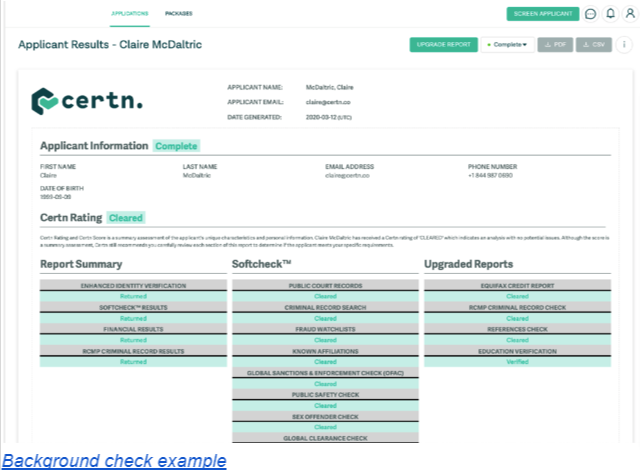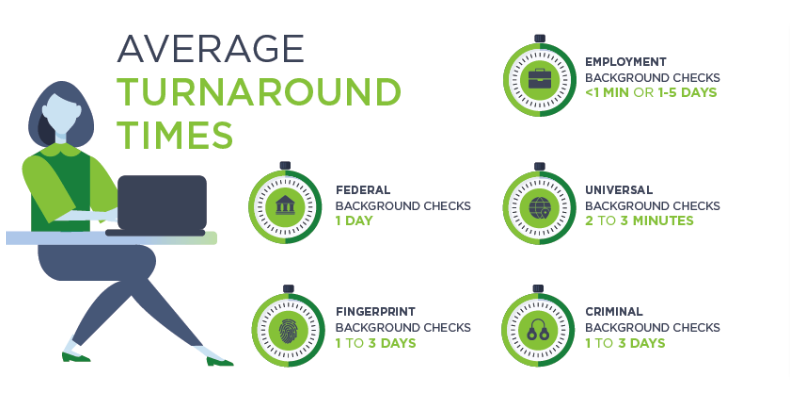You found the NoHQ website, which means one of two things: your company either works remotely already or wants to make the switch. Count yourself among the 25% of the employers in the North American job market navigating that territory. With such a competitive hiring landscape, it can be hard to feel confident that your talent acquisition process yields top remote talent.
A great deal of time and resources goes into recruiting as it is. Once your team wraps the final interview for a potentially stellar fit, it can be natural to feel like the vetting is complete. But if you want to hire confidently, one crucial step remains — the pre-employment background check.
While this can get confusing, don’t worry, NoHQ is here to help. Read on to learn how to best implement a background screening process that fits your remote work culture.
What is a Pre-Employment Background Check?
An effective screening process uncovers pertinent records and history about a potential employee. The consolidated results help employers evaluate candidates while mitigating risk and ensuring adherence to applicable laws or regulations.
Background checks prove so essential that 94% of employers utilize them. Options exist for companies to tailor the screening process around their individual needs. Although not a panacea for acquiring top talent, a background check represents a vital aspect of a hiring toolkit.

How Long Do Pre-Employment Background Checks Take?
A lot goes into even the most basic background check. Depending on how a company decides to focus the screening process, it can require contacting multiple previous employers, educational institutions, and credit bureaus. These searches unearth work history, credit history, and criminal records. Together, they give an aggregated and actionable account of their background for employers to assess.
So, how long does a pre-employment background check take? The answer is: it depends. A background check takes as little as two to five business days at best. However, some background checks can take as long as 14 days or even a month. It all depends on the breadth of the searches required.
Thankfully the background screening process is highly customizable, allowing businesses to pick the types of checks that suit their individual needs in terms of scope and time. For example, a company hiring for a position that requires driving should opt for a driving history check, while a company filling a WFH position can skip the driving check altogether to save time and resources.

Background Check Delays
While delays can sometimes hinder the process, a basic background check typically clears in the two-to-five business day range. Some roadblocks still exist in all background screening processes, however. Here are some of the most likely culprits to be on the lookout for:
- Drug Testing Delays: Candidate scheduling and clinic delays can cause slowdowns.
- Fair Credit Reporting Act: Delays often stem from candidates being slow when reading and completing the authorization form.
- County Court Information: Some counties don’t have online records, which can require a representative to go through the time-consuming process of checking records by hand.
- Incomplete Background Check Request Forms: Delays often stem from candidates not filling out all the required information to authorize a background check.
- Lived Overseas: If an employee attended school or worked in another country, an international background check may be necessary, which can take four to five days.
- Aliases and Name Variances: If a candidate used a different name previously, the background check service conducts a time-consuming manual check.
Types of Background Checks
Criminal Background Checks
Risk mitigation drives the need for pre-employment background checks. A criminal history record helps assess risk more than any other screening type. By gathering criminal history on a county, state, federal, or national level, an employer can determine and evaluate any risks associated with hiring a candidate with a criminal record to make an informed decision.
Identity Verification
Identity verification protects employers from bringing on dishonest or fraudulent candidates by verifying the candidate's identity credentials. The process requires potential hires to submit a combination of authorized identity documents such as passports, government-issued IDs, birth certificates, or visas for identity authentication.
Credit Background Checks
Employment credit checks represent a crucial indicator to assess candidates for roles where the employee will handle or manage money. By looking at credit-to-debt ratio and past bankruptcies, companies gain insight into how the candidate handled bill and credit payments in the past, informing the employer's hiring decision for such positions.
Education Background Checks
Education verification identifies potential misrepresentations by authenticating reported certifications, training, and educational history. These checks reveal attendance dates, majors, and degrees of potential hires at the high school and university levels.
Why is Remote Pre-Employment Background Checking Important?
Hiring for remote positions presents a unique set of challenges. Hiring managers may never meet remote candidates in person, stripping critical interpersonal elements from the interview process. On top of that, some candidates struggle to fit into remote roles despite being outstanding prospects otherwise. Background checks increase confidence and trust in chosen candidates by filling in the information gaps that can't be gleaned by CVs and interviews alone.
It Helps Ensure Compliance with Applicable Laws or Regulations
A company can be held liable for negligent hiring for failing to investigate a candidate before onboarding if that candidate goes on to commit serious misconduct or perform illegal activities as an employee. On top of liability, punitive damages could result from such a scenario, potentially costing the company millions.
Additionally, industries have regulatory requirements surrounding pre-employment background checks. Remote employees maintain access to the same sensitive information as co-located employees. Employers in childcare, healthcare, finance, IT, and other industries must conduct adequate remote pre-employment background checks to comply with applicable laws and ordinances.
It Helps Determine Qualifications
Background checks don't just reveal negative information. To meet current trends, candidates exclude extraneous information in favor of streamlined resumes. A background check could uncover education or certification that bolsters the case for employment as easily as an embellishment a candidate offered in place of actual qualifications.
It Helps Determine Work History
One of the most standout criteria a candidate can provide on their CV is excellent and applicable work experience. Unsurprisingly, embellished, inaccurate, or out-of-date information commonly finds its way onto resumes. A thorough screening process reveals a potential hire's work history, verifying their stated ability to fulfill your position's duties and requirements before onboarding.
How to Conduct Remote Pre-Employment Background Checks?
Step #1: Create A Background Check Policy
Regulations surrounding background checks don't just protect employers and the public. Laws exist to protect candidates as well. To maintain compliance with applicable laws, a consistent, fair, and comprehensive background check policy remains essential.
Step #2: Get Legal Advice
Local, state, and federal laws must be considered when establishing a policy. Candidates grant employers access to sensitive information when consenting to background checks. Just as employees must meet standards regarding sensitive information, employers have the same obligation under the Fair Credit Reporting Act when running a credit check for instance.
On top of that, some states prohibit employers from gathering select information, such as states with ban-the-box laws. Seek professional legal guidance before adopting a background screening process to avoid illegal background checks.
Step #3: Contact Candidate References
Pre-employment screening isn't limited to background checks. Culture fit, ease of management, interaction, and ability to fulfill specific job duties can all be ascertained by conducting reference checks. Set up phone calls with two to three references. Before the calls, prepare a list of questions to help confirm or deny the candidate's skills and work ethic.
Step #4: Do Online Searching And Social Networking
An underrated screening tactic, online searches can yield background information to help employers understand potential employees. Many people maintain public social media profiles. Because of that, a company can protect its brand reputation by reviewing the content a candidate shares. Check for public profiles. Consider what content the candidate shares and how that coincides with your company's brand and reputation.
Hire With Confidence
So, how do you know that the candidate your company wants to hire is the candidate your company should hire? The pre-employment background check represents a vital tool. But, creating a thriving remote work culture doesn’t stop there.
From our hiring guide to our remote technology toolkit, NoHQ has what you need to find, hire, and deploy great remote talent with great confidence. Come check out all that our team of experts and community of remote work enthusiasts have to offer.
